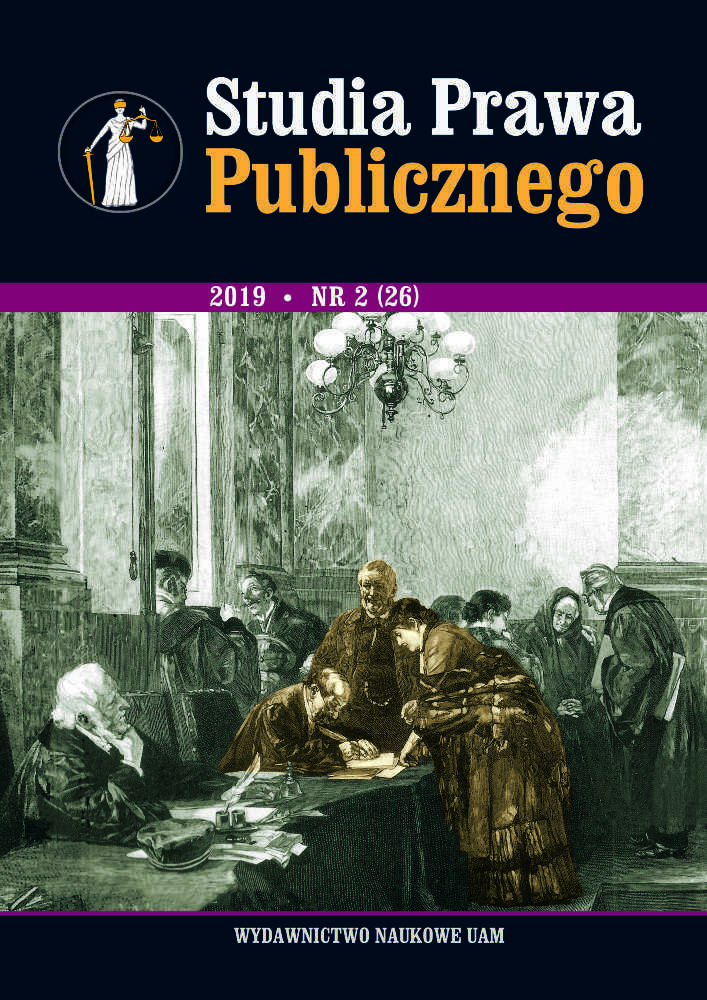Abstract
The legislator’s fee and spa subsidy established a source of income for a local government unit that has the status of a spa (health resort) municipality. The health resort municipality may collect the health resort fee from natural persons staying more than one day for health, tourist, leisure and training purposes in the area of the health resort, applying the allowances and preferences indicated in the relevant act implementing the own tasks in the scope of preserving the spa functions of health resort for the award of a spa subsidy from the state budget. Both sources of financing of the health resort municipality are the compensation for the lost income of the health resort municipalities due to statutory restrictions on the economic and investment development of this type of local government unit. Often there are conflicts of interpretation concerning the adoption and implementation of the collection of the health resort fee, as well as in matters concerning the rules, manner and purpose of the use of the fee and the health resort subsidy by the health resort municipalities. The aim of the article is to present the most important aspects of the essence and legal nature of the fee and spa subsidy. The legal basis defining the functioning of the fee and spa subsidy has been discussed in historical perspective, from the late nineteenth century to the present, in the context of the income component of the spa commune under the provisions of administrative and tax law. The research considerations were based on the review of legislative acts regulating this matter in the aspect of the repealed and applicable law and positions presented in the literature on the subject. Proposals for legislative changes in this area have been presented, simultaneously indicating the purpose and effects of the amendment.
References
Bonikowska M., Wykładnia art. 17 ust.2 pkt 2 ustawy z 12 stycznia 1991 r. o podatkach i opłatach lokalnych, „Przegląd Prawa Publicznego” 2012, nr 2.
Ciszewski F., Warunki ekonomiczne i polityczne i ich wpływ na organizację zdrojowisk, „Problemy uzdrowiskowe XI-XII”, z. 11-12, Warszawa 1988.
Dowgier R., Zmiany w podatkach i opłatach lokalnych 2005/2006 (cz.II), „Przegląd podatków lokalnych i finansów samorządowych” 2006, nr 1.
Dudar G., Opłata uzdrowiskowa – problemy praktyczne, „Przegląd Podatków Lokalnych i Finansów Samorządowych”, 2006, nr 6.
Kochański J.W., Zarys historii polskiego lecznictwa uzdrowiskowego na przełomie XIX i XX wieku, w: Lecznictwo Uzdrowiskowe, Wrocław 2008.
Lutostański B., Projekt ogólnej ustawy zdrojowej, Kraków 18 luty 1871 r., ”Przegląd Lekarski” 1871 r., nr 8.
Lutostański B., Projekt Ustawy zdrojowej w ogólnych zarysach roku, w: B. Lutostański Przemysł zdrojowo-leczniczy i ustawa dla zdrojowisk krajowych, Kraków 1886.
Michalak – Trybus B., 10 lat funkcjonowania Gminy Iwonicz-Zdrój pod rządami nowej ustawy uzdrowiskowej, w: Iwonicz-Zdrój Rocznik Stowarzyszenia Przyjaciół Iwonicza-Zdroju, t. XII 2014-2015, Iwonicz-Zdrój 2016.
Zdybel M., Opłata uzdrowiskowa jako źródło dochodów gminy - wybrane zagadnienia prawnofinansowe, w: Finanse lokalne, Wybrane Zagadnienia, pod red. L. Patrzałek, Poznań 2009.
License
Copyright (c) 2019 Bogusława Michalak-Trybus

This work is licensed under a Creative Commons Attribution-NonCommercial-NoDerivatives 4.0 International License.

